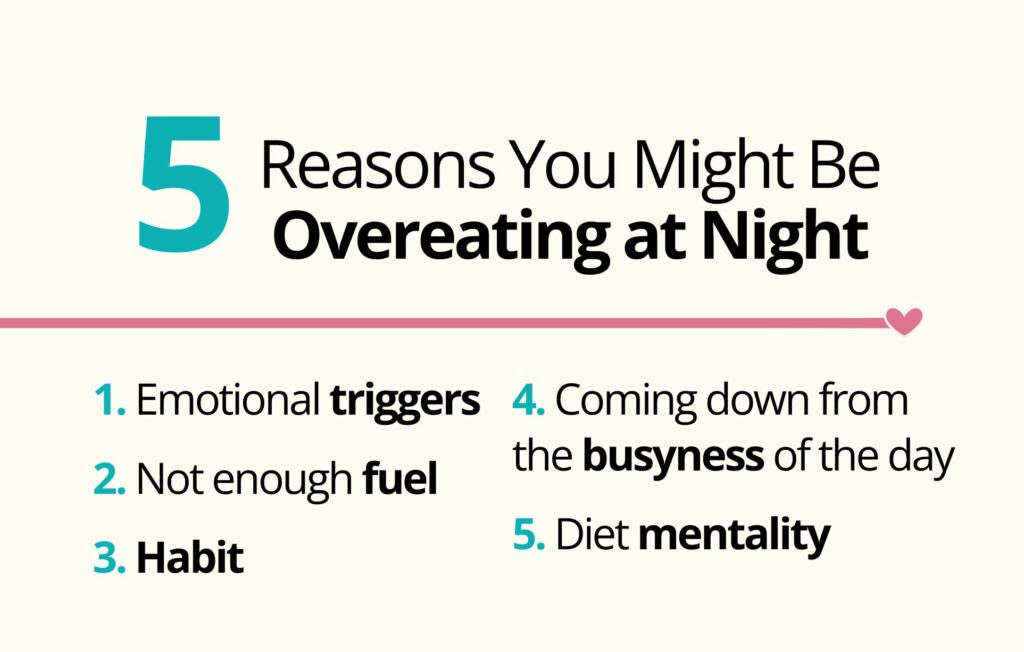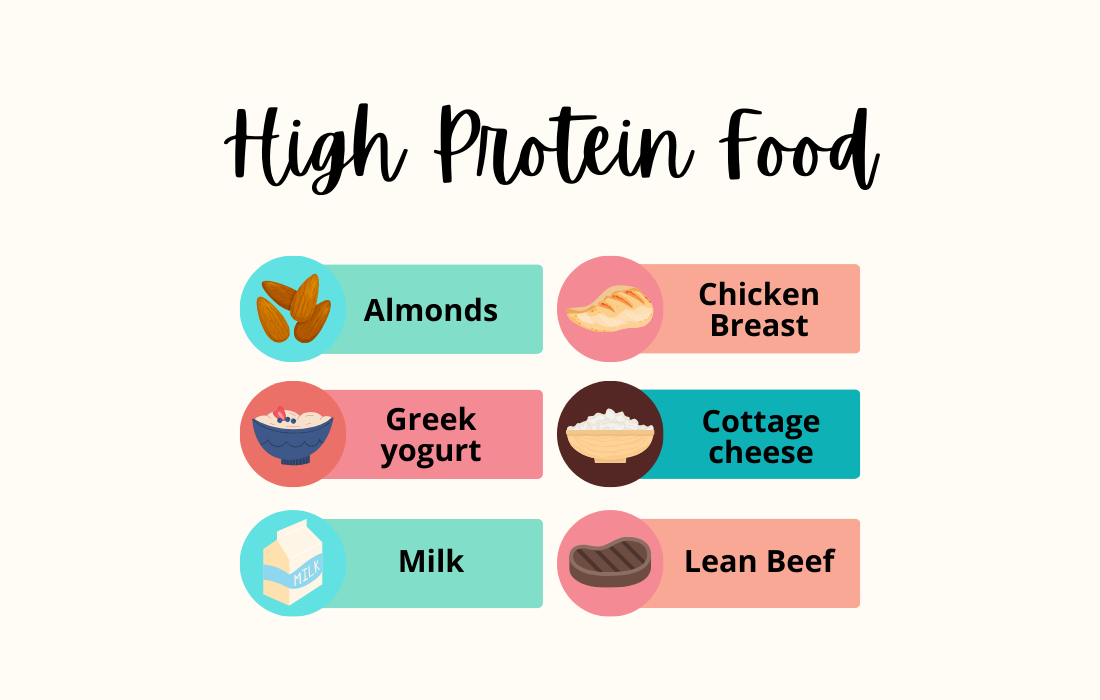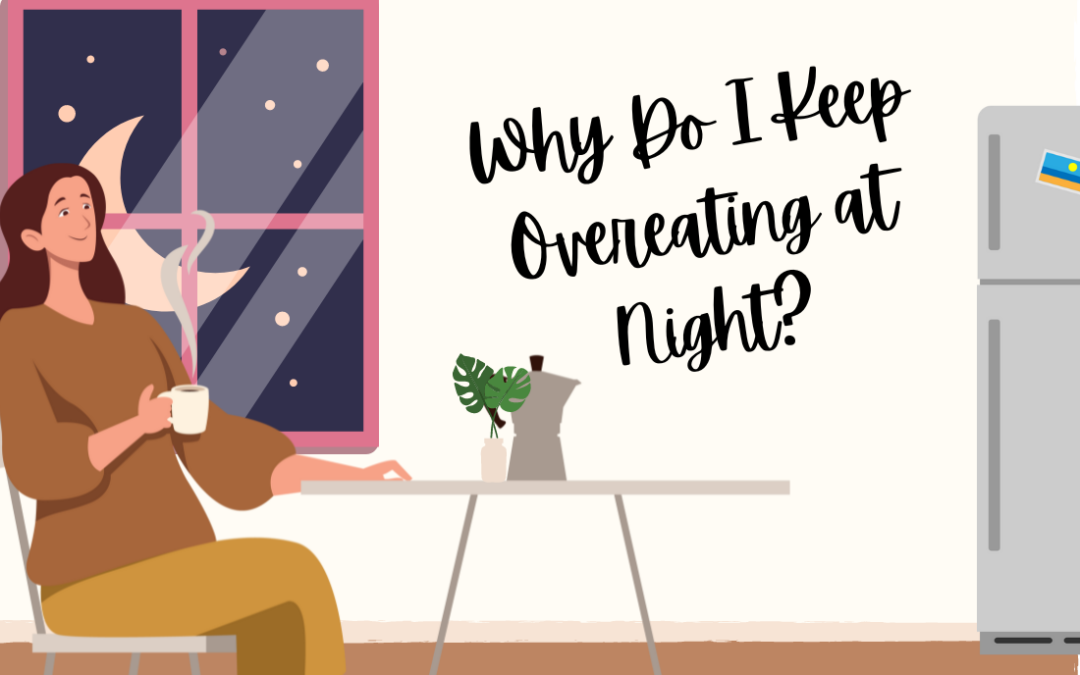I understand how frustrating it can be to feel like you’re constantly battling against nighttime overeating, despite your best efforts to control it.
Written by Jenn Hand, Holistic Nutritionist, Board Certified Health Coach & Binge Eating Coach, NBC-HWC
You’re not alone in this struggle, and it’s essential to recognize that overcoming these challenges takes time and cultivating lots of compassion towards yourself.
Top 5 Reasons You Might Be Overeating at Night (Even Though You’re Trying Hard Not To)
1. Emotional triggers
Even when we try to resist, emotional triggers such as stress, boredom, loneliness, or sadness can drive us towards food as a source of comfort and distraction.
2. Not enough fuel
Skipping meals or not eating enough during the day can set the stage for overeating at night due to increased hunger and cravings for energy-dense foods.
3. Habit
Nighttime overeating can become a habitual behavior, especially if it’s been reinforced over time by consistently turning to food for comfort or reward in the evenings.
4. Coming down from the busy-ness of the day
Eating at night often occurs mindlessly, without paying attention to physical hunger and fullness cues, since it may be the first time we have a break–leading to overconsumption without genuine satisfaction.
5. Diet mentality
Restrictive dieting or food rules during the day can trigger feelings of deprivation, making it more challenging to resist the allure of overindulging at night when willpower is depleted.

3 Simple Steps to Reduce Nighttime Overeating
1. Prioritize eating protein and carbs every 3-4 hours
I teach this to almost every woman I work with.
This simple guideline can stabilize your blood sugar, giving you a starting point and allow you to develop a rhythm to your day.
Nourish your body with balanced meals and snacks throughout the day, including a combination of protein, fiber, and healthy fats to help stabilize blood sugar levels and reduce cravings later on.
2. Practice slowing down
Cultivate mindfulness around eating by slowing down, savoring each bite, and paying attention to hunger and fullness cues.
Check in with yourself before reaching for food at night to determine if you’re truly hungry or if there’s another need you’re trying to fulfill.
3. Explore non-food solutions to help cope with emotions
Explore and address the underlying emotions or stressors that drive nighttime overeating.
Develop alternative coping strategies for managing stress, boredom, or emotional discomfort that don’t involve food, such as journaling, deep breathing exercises, or meditation.
Remember, progress is not always linear, and setbacks are a natural part of the journey towards finding peace with food. Be patient with yourself, practice self-compassion, and seek support if needed.

Common Questions
How can I break the cycle of nighttime overeating?
To break the cycle of nighttime overeating, focus on balanced meals throughout the day to prevent extreme hunger in the evening, and practice mindful eating to tune into hunger and fullness cues.
Does stress affect my nighttime eating habits?
Yes, stress can affect nighttime eating habits by triggering emotional eating or cravings for comfort foods as a way to soothe stress-related emotions.
Why do I crave junk food more at night?
Craving junk food more at night could be due to a combination of factors, including habit, boredom, stress, and fatigue, as well as the brain’s response to cues like relaxation and winding down.
Are there any effective strategies to control nighttime cravings?
Effective strategies to control nighttime cravings include planning satisfying and balanced meals throughout the day, having nutritious snacks on hand, practicing stress management techniques, and creating a relaxing bedtime routine to promote better sleep.
How can I differentiate between actual hunger and boredom eating?
Differentiate between actual hunger and boredom eating by tuning into physical cues of hunger, such as stomach growling or low energy levels, and asking yourself if eating will truly satisfy physical hunger or if you’re seeking food out of habit or boredom.
What are some healthy snack options if I get hungry at night?
Healthy snack options if you get hungry at night: Greek yogurt with berries, a handful of nuts, a piece of fruit with nut butter, or whole-grain toast with avocado.
Can changing my daytime eating habits impact my nighttime eating patterns?
Yes, changing daytime eating habits, such as eating balanced meals and snacks throughout the day, staying hydrated, and managing stress, can positively impact nighttime eating patterns by reducing the likelihood of extreme hunger and cravings in the evening.
Why do I tend to overeat at night when I’m trying to diet or eat healthy during the day?
Tending to overeat at night when trying to diet or eat healthy during the day could be due to feelings of deprivation from restrictive eating patterns, leading to increased cravings and overeating when we get to the end of the day.
Related Articles
⚪ How to Stop Overeating: 27 Things I’ve Done that Work
⚪ The Biggest Cause of Overeating at Night
⚪ How To Stop Overeating At Night
Get the Normal Eater’s Newsletter
Join 8000+ women who are overcoming overeating, binge eating, and breaking up with dieting forever. Get Jenn’s inspiring and actionable weekly newsletter with the latest posts, podcasts, and tips on how to love your body, find food freedom, and lose weight holistically.
Get the Normal Eater’s NewsletterWork with an Emotional Eating & Holistic Nutrition Coach
Overcome Bingeing and Emotional Eating, and Break Up with Yo-yo Dieting
Working with an emotional eating coach and holistic nutritionist can help you get free from the frustrating binge and restrict cycle and stop yo-yo dieting.
You don’t have to be obsessed with food or have a million rules around eating to find your natural weight and learn to love your body. Ready to actually see a lasting change and experience true freedom?
Schedule a 20-min CallAbout the Author:

Jenn Hand has been helping women like you become normal eaters since 2015.
She’s worked with thousands of women, helping them to balance their bodies, end bingeing, stop obsessing over food, and start feeling amazing again. As a board-certified health coach and holistic nutritionist, Jenn knows how to support you in making real positive changes that last.
Her articles have been published on Mind Body Green, Tiny Buddha, Thrive Global and other local and global media platforms. She’s the author of How to Be a Normal Eater and the creator of The Normal Eater’s Club program. Listen to Jenn’s advice and tips on the Cake Doesn’t Count Podcast, or read more of her articles for free on the Food Freedom Blog.
Learn About Coaching!




